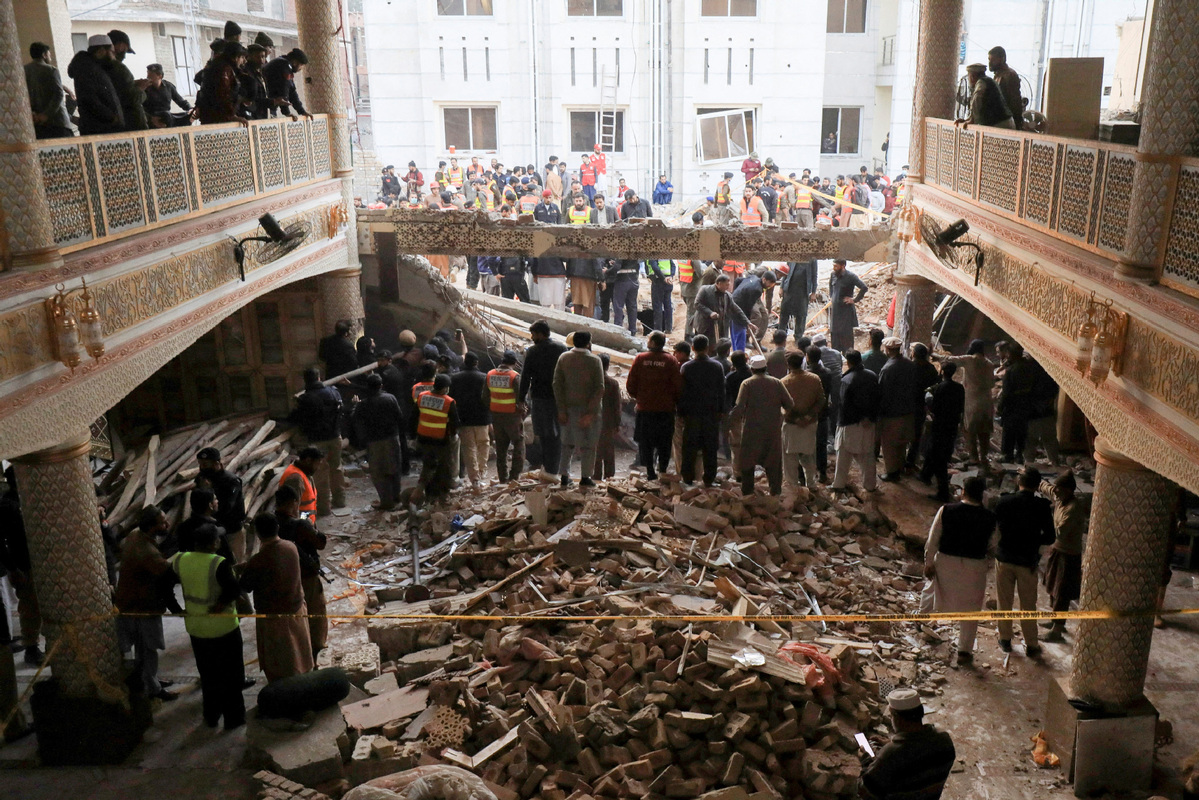US faulted for terrorism surge in Pakistan
By XU WEIWEI in Hong Kong | China Daily Global | Updated: 2023-02-13 10:01
Abrupt withdrawal from Afghanistan has compromised security, analysts say

The continued threat of terrorism evidenced by a bomb blast in Peshawar, Pakistan, on Jan 31 that killed at least 100 people demonstrates the impact of regional insecurity following the United States-led NATO's long occupation of Afghanistan and its abrupt withdrawal, experts say.
However, the situation in Pakistan is likely to improve with continuing efforts by Pakistan and support from other countries, they say.
"The explosion is another manifestation of the rise of terrorism in Pakistan," said Salman Bashir, a former Pakistani ambassador to China.
The blast that ripped through a crowded mosque in Peshawar on Jan 31 killed worshippers and wounded more than 200 others, mostly police officers and families, according to hospital and police officials.
Shakeel Ahmad Ramay, chief executive of the Asian Institute of Eco-civilization Research and Development in Islamabad, said the premature and ill-prepared withdrawal from Afghanistan by the US and its allies had created a vacuum in regional security and anti-terrorism efforts.
There have even been claims that the premature nature of the withdrawal was deliberate, calculated by the US to create chaos in the region, the prime targets being Pakistan and China, Ramay said.
"So, they (the US) hatched their interest groups in the region. Now terrorists are also exploiting the situation to target Pakistan."
Amina Khan, director of the Centre for Afghanistan, Middle East and Africa at the Institute of Strategic Studies Islamabad, speaking of the Peshawar blast, said: "This again unfortunately was expected, primarily because the Tehrik-e-Taliban Pakistan, or TTP, had made it very clear (they had put an end to their agreed cease-fire with the government and) had declared a full-fledged war on the state of Pakistan."
Pakistani police had found a network of terrorists behind the deadly mosque bombing in Khyber Pakhtunkhwa province, police said on Feb 2.
The head of Khyber Pakhtunkhwa police, Moazzam Jah Ansari, said evidence showed that the Jamaat-ul-Ahrar faction of the banned TTP was behind the attack.
The Taliban are struggling when it comes to the security of Afghanistan, Khan said. The Taliban have to look after the security of the entire country as well as fight against the Islamic State Khorasan Province, she said.
"Therefore, the US withdrawal indirectly but obviously has played a role in compromising the security of Afghanistan, and of the region as a whole."
Imtiaz Gul, executive director of the Center for Research and Security Studies in Pakistan, said this is a continuation of the proxy terrorism that Pakistan has faced for at least 10 years.
Chaos and uncertainty
The Peshawar bombing was the third-most deadly attack in the city in recent years. Terrorists had attacked All Saints' Church in September 2013, killing scores of people, and in December 2014 gunmen attacked the Army Public School, leaving more than 150 people dead.
"This basically means the proxy terrorists are attacking across the board," Gul said, indiscriminately killing innocent people as well as security forces in order to create chaos and uncertainty.
"This obviously creates a great sense of insecurity in Pakistan. …History also tells us that proxy terrorism has been an essential tool of geopolitics, and this is what we see today around Pakistan and in Afghanistan."
Mustafa Hyder Sayed, executive director of the think tank Pakistan-China Institute in Islamabad, said terrorism is "faceless, borderless and it has no religion, caste or creed", and is a threat to humanity.
"Pakistan will combat and eliminate these terrorists because Pakistan, along with China in the China-Pakistan Economic Corridor, seeks to become a major economic power of Asia. And if we want to do that, there is no room for insecurity and terrorism."
Xinhua contributed to the story.
























